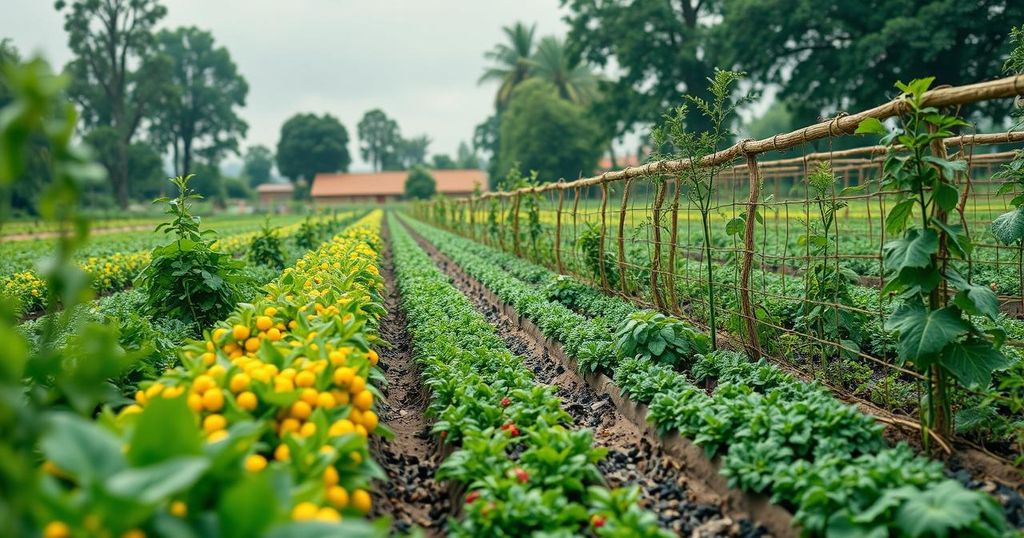A panel of agricultural experts at the 2024 World AgriFood Innovation Conference in Beijing has called for an innovation-driven green transition to combat the effects of climate change on food production. Experts emphasized the need for investment in research and sustainable practices, predicting a significant reduction in food output if innovations are not adopted. China’s ambitious goals and initiatives in enhancing food security were highlighted as a prominent example for the global community.
A global panel of agricultural experts has advocated for an innovation-driven green transition within the agri-food sector to mitigate carbon emissions and counter the impacts of climate change on food production. This call to action was made during the 2024 World AgriFood Innovation Conference in Beijing, organized by China Agricultural University. Sun Qixin, the president of the university, indicated that mainstream projections reveal a potential decrease of 6 to 8 percent in food production for each 1°C increase in global temperatures, unless technological advancements are employed to alleviate these adverse effects. Despite certain agricultural regions benefiting from warmer climates, the overall disruption of agricultural activities due to unpredictable weather patterns, particularly in Asia, Africa, and South America, poses significant challenges. For instance, this year witnessed severe droughts leading to significant crop failures in Brazil and China’s provinces of Henan and Shandong. Sun emphasized the necessity for substantial investment in research to ensure that the required reduction of agricultural inputs, such as fertilizers, does not compromise food output. Fu Wenge, another academic from China Agricultural University, highlighted that the innovations essential for enabling a green transition do not always necessitate groundbreaking scientific advancements; even modest and cost-effective management reforms can yield substantial benefits. He referenced the university’s Science and Technology Backyard initiative, designed to enhance the yield of crop varieties and sustainable farming practices among smallholder farmers, which has been successfully implemented in various global contexts. Ismahane Elouafi, from the Consultative Group on International Agricultural Research (CGIAR), supported the notion that a comprehensive green transition encompasses technological, policy, and institutional innovations, necessitating collaborative efforts among nations. She remarked, “The impact of climate change is multiplying every day, and the only way forward for us is to adopt innovation in its broad sense to really transform the agriculture system.” Looking ahead, the experts asserted the importance of increasing food production while lowering its carbon footprint and caring for the environment. Patrick Caron, vice-chair of the CGIAR system board, reflected that humanity’s historical success in boosting food production must now be approached with a focus on environmental sustainability. During the World Food Day observance, attention turned toward China’s ambitious goal of elevating its food production capacity to around 700 million metric tons by 2030. Elouafi underscored China’s role in global food security and poverty alleviation, noting its significant enhancements to agricultural productivity and rural income since the early 2000s. As the leading global food producer, China cultivates a quarter of the world’s food on under 9 percent of arable land. Foreign Ministry spokesperson Mao Ning reaffirmed that China is committed to global food security by providing aid to nations in distress and sharing agricultural technology to enrich food production capabilities in the developing world. “China has provided more funding and experts and undertaken more projects than any other developing country under the framework of the Food and Agriculture Organization’s South-South Cooperation Programme,” Mao conveyed.
The article discusses the urgency of a green transition in the agri-food sector to combat climate change and reduce agricultural carbon emissions. It highlights insights shared during the 2024 World AgriFood Innovation Conference in Beijing, organized by China Agricultural University. Key agricultural leaders stress the necessity for innovation and sustainable practices to enhance food production in the face of climate challenges, given that agriculture is a significant contributor to global greenhouse gas emissions. The discourse also emphasizes China’s role in global food security through its innovative agricultural practices and collaborative efforts in enhancing food production in developing countries.
In conclusion, the global call for a green transition in the agri-food sector underscores the pressing need for innovation and sustainable practices to mitigate climate change impacts on food production. As experts advocate for collaborative efforts and technological advancements, China’s significant contributions to food security serve as a hopeful example for the global community. The path forward necessitates greater awareness and investment in sustainable agricultural methods to ensure a resilient and secure food future.
Original Source: news.cau.edu.cn







